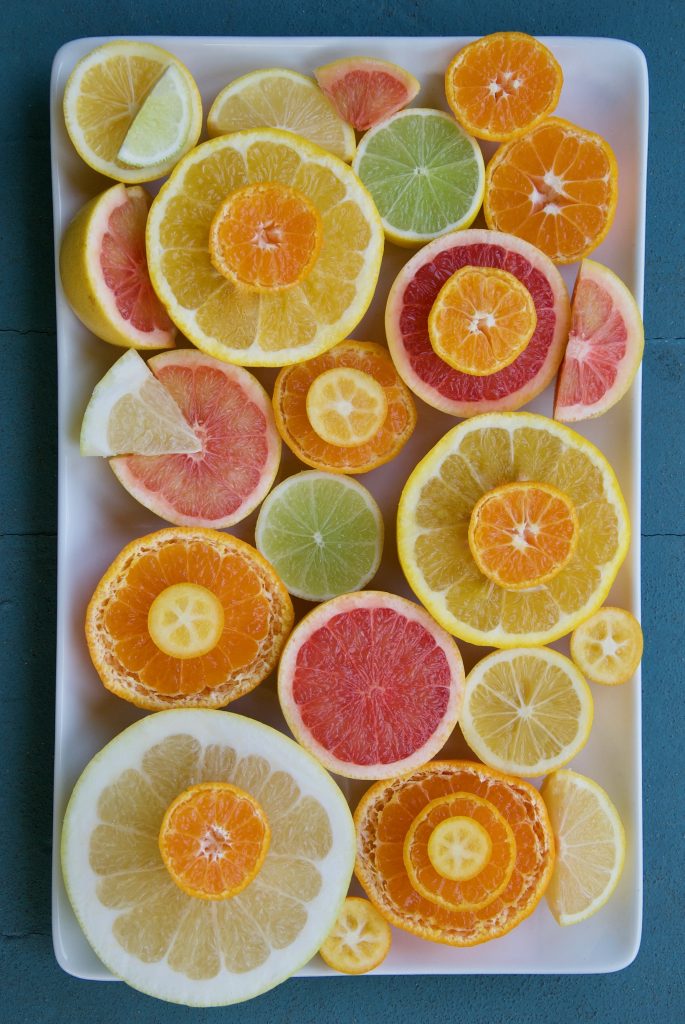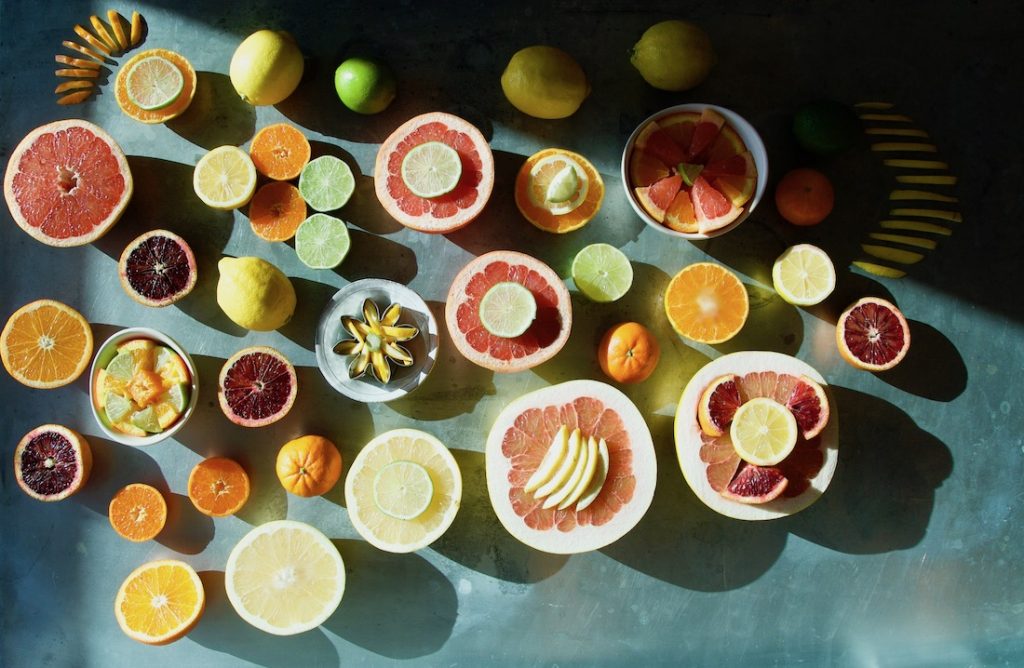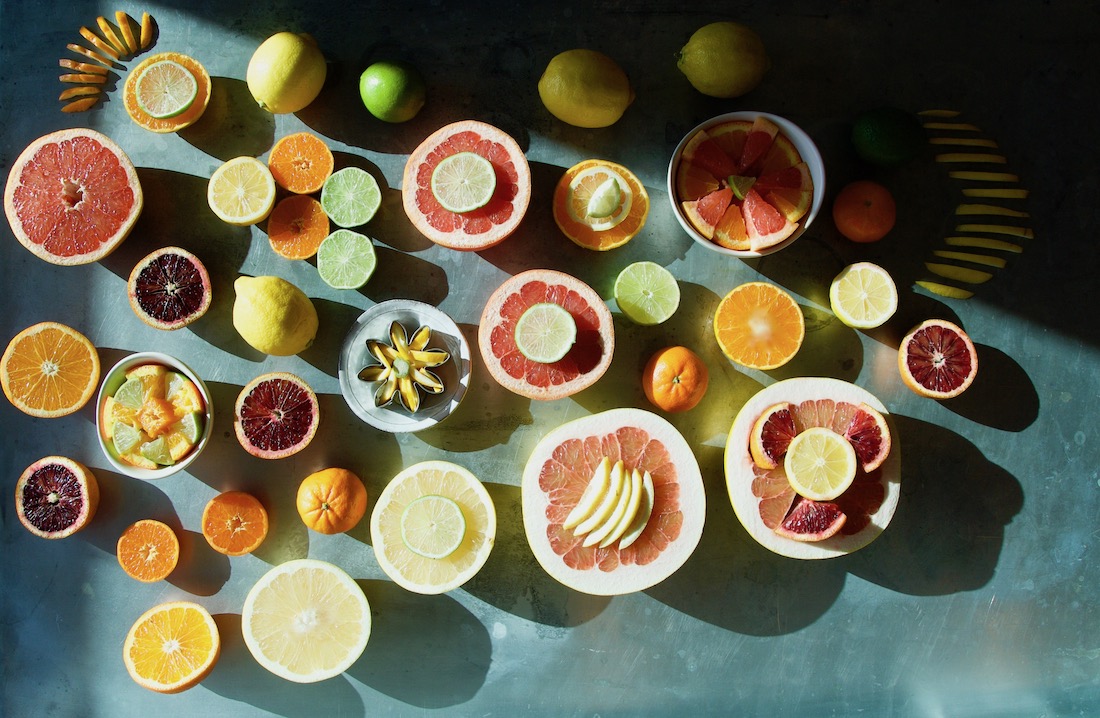Citrus fruits are nature’s little bundles of zen, providing ideal aromatherapy for anxiety, for a number of reasons. Research from the U.S. National Library of Medicine shows that lemon and sweet orange oil, among other citrus scents, have a positive effect on physical, mental, and spiritual wellbeing.
This is partially because the smell of citrus has a positive effect on the limbic system– a complex system of brain structure involved in coordination emotion, motivation, learning, memory, and yes, anxiety.
And because aromatherapy has very few side affects, everyone from cancer researchers to naturopaths have been looking into the health benefits of scent and its potential applications in a variety of health contexts. This is, however, only part of the story that makes the smell of citrus so helpful for stress and anxiety.
Below, we explore what the scientific literature says– and float some new theories about why we could all use more exposure to nature’s most perfect class of fruit.
Citrus Aromatherapy For Anxiety
It’s easy to surround yourself with the smell of citrus even when you don’t have access to the fruit. Look for it in all-natural perfumes like John Masters Organics sparkling citrus roll-on fragrance, or choose a citrus-scented candle like Homesick brand’s lemon-zest infused “Southern California” soy candle.
Citrus soap has lots of positive effects for body and mind (I love Burt’s Bees Energizing Citrus Ginger Body Wash, and also Mrs. Meyer’s Lemon Verbena Hand Soap). Using citrus-scented all-natural cleaning products is also a subtle way to incorporate aromatherapy into your home.
Making these subtle swaps can be helpful for people who need active stress relief. (And if cleaning stresses you out, try using Mrs. Meyer’s Lemon Verbena Everyday Multi-Surface Cleaner and inhaling deeply. I’m not joking! It helps.)
You can also seek out aromatherapy essential oils in citrus flavors, specifically. (Click the links to some of our most trusted products through or Amazon Affiliate links, below. As an Amazon Affiliate, we may earn from qualifying purchases, which is why we work our butts off to research and personally test everything we recommend on ourselves and our families.)
Either way: surround yourself with the smell of citrus, and you’ll notice an improvement in your mood almost immediately.
View this post on Instagram
Citrus Essential Oils for Anxiety
Essential oils with citrus aroma notes include: bergamot, grapefruit, lemon, lemongrass, lime, mandarin, neroli, and sweet orange oil, which latter has less of a “zesty” scent. Use essential oils in diffusers or for massage.
-
Try The Shower Trick
For a nice, passive treatment, try adding a few drops to the bottom of the tub while you shower. Inhale deeply and feel your spirits lift. It’s super relaxing and refreshing!
Lemon essential oil is uplifting and relaxing– I love using it for a morning shower. It’s also helpful in treating wounds when added to natural salves and anti-bacterial ointment.
Bergamot essential oil (a green citrus fruit native to the Mediterranean and also the flavor behind earl grey tea) is calming, uplifting, and a powerful antiseptic agent.
If you’re trying to wean yourself off of using antibacterial soaps, bergamot-scented liquid soap is a nice alternative. Citrus essential oils like Lemongrass, Neroli, and Sweet Orange Oil are antiseptic and antibacterial, and they also naturally destroy bad odors. This is why they’re added to natural cleaning formulas as an alternative to harsh chemicals.
As we mention in our article on the Best Snacks for Flight Anxiety, the smell of citrus is calming to the nervous system. Vitamin C also boosts immunity at a time when it is most compromised. (E.g. on a plane, passengers are confined in close quarters while the body is under stress. This is also a time when our exposure to germs and radiation is high.)
10 Emotional Conditions That Benefit from Citrus Aromatherapy
(& the Scents That Work Best)
- Anger – Bergamot, Neroli, Orange
- Anxiety – Orange, Neroli
- Depression – Bergamot, Grapefruit, Lemon, Mandarin, Neroli, Orange
- Fatigue/Burnout – Bergamot, Grapefruit, Lemon
- Fear – Grapefruit, Bergamot, Lemon, Neroli, Orange
- Grief – Neroli
- Insecurity – Bergamot
- Memory – Lemon
- Panic Attacks – Orange, Bergamot, Neroli
- Mild Stress – Bergamot, Neroli, Orange
Peeling an Orange
As we discuss in our Anxiety Relief Guide, peeling an orange during periods of stress is helpful even if you don’t feel like eating the orange– you’ll experience the aromatherapy benefits for anxiety just by peeling it. The trick here is that busy hands help idle minds.
When you’re nervous, it helps to perform small tasks. Do something that doesn’t require too much cognitive bandwidth or emotional fortitude. Knitting, playing with a Rubik’s cube, and puzzling can also help. But when you peel an orange, you’ll also get the added benefits of citrus aromatherapy for anxiety.
For maximum benefit, try slowly peeling the orange to see if you can get the peel off in one piece. Others go so far as to see if they can peel the translucent skin off of each slice of orange. (Do this if removing the peel wasn’t enough to take the edge off your spiraling thoughts. It’s a weird, specific way to distract yourself, but it works!)

Calming From the Inside Out
The CDC’s Second National Report on Biochemical Indicators of Diet and Nutrition also found that over 16 million people over the age of 6 in the United States are deficient in Vitamin C.
Ironically, Vitamin C levels in the body decline rapidly in response to stress, or other physical and emotional health problems. The people with the lowest Vitamin C levels were in the 20-59 year old range. Interestingly, this is the same age range in which most people experience unprecedented stress. Coincidence? Probably not.
It’s common in the realm of nutrition to hear people say, “Hey, I love fruit! If anything I’m trying to eat less fruit in order to eat more vegetables!”
Whether you’ve heard that ethos expressed before or not, it is nevertheless surprising. Most adults are deficient in this fundamental, essential nutrient. Why? Because we often think we eat more fruit and Vitamin C rich vegetables than we actually do. Ask yourself: is this you?
If so, then try drinking hot water with a squeeze of lemon. This combo is calming for the nervous system and the adrenals, which, when inflamed, can precipitate a stress response.
Meanwhile, drinking tea with lemon is also a subtle way to consume more Vitamin C, without added calories or sugar. (Not that fruit isn’t good for you, because it is! We don’t want to perpetuate that myth.)
Drinking hot lemon water is also a proven method to soothe the digestive system. Try drinking this hot beverage if you experience nervous stomach when you’re anxious.
Comfort While Traveling
Oranges are more or less the perfect snack for planes— they are a source of natural hydration and immunity because they are rich in Vitamin C, but they are also allowed through security even though they are basically a ball of juice.
This is helpful because airplane travel compromises the immune system. In close quarters, the cold and flu virus can be hard to avoid. Traveling with an orange is a helpful way to bolster against these common sicknesses– it’s also natural aromatherapy for anxious flyers.
Most importantly, peeling an orange is ideal during turbulence. Removing the skin from each individual orange slice is a good trick if you’re stuck in your seat during turbulence.
The smell of citrus is calming and also elevates mood. (You’re also less likely to bother the people sitting next to you. Unlike those folks who bring smelly or fried food into economy class, stinking up the plane.)

Soothing Color and Texture
In addition to delivering subtle aromatherapy for anxiety, pink and orange citrus hues are visually relaxing to the mind. Why? It’s a long story, but basically in the 1980’s researchers in Seattle discovered that putting extremely agitated people in rooms with pink walls could significantly reduce these people’s feelings of anger, rage, and fear.
The specific shade of “Baker Miller Pink” is roughly the same shade as a pink grapefruit. Another theory suggests that the comforting effect of pink has something to do with the first color we all see in the womb. (I’ll leave it at that.)
Being able to neatly divide citrus fruits into quarters and sections also acts as a sort of visual ASMR— its a food that gives our hands something to do (when we peel and break it open) and it’s very symmetrical (visually pleasing).
The fact that all the sections and peel fit together neatly also soothes the mind (on a subconscious level, we like visual structure and order– ala Mari Kondo’s “messy life, messy mind” theory).
Unlike a pomegranate or a tumble of overgrown grapes, there’s a symmetry and purpose to the sections of an orange that few other fruits have. The aromatherapy they offer for anxiety is just a bonus.
The fruit is also round and easy to hold, embodying the Japanese design principle of ensō (円相 , or “circle”), which expresses the moment when the mind becomes free to let the body create.
In this way, colorful citrus fruits are like a 3D scented puzzle– one that’s capable of stimulating all of our senses at the same time.
***
Related: For more stress and anxiety tips, consult our Comprehensive Guide to Anxiety Relief: 25 Research-Backed Ways to Mitigate Stress.
For science-backed recipes that promote mental wellness, visit our Mood Recipes section. (You may also want to read our article on How Weighted Blankets Can Improve Sleep, Stress, and Anxiety. Or check out our post on How To Stop Racing Thoughts at Night.)
Related: The 11 Most Effective Herbal Remedies for Insomnia and Anxiety.

[…] are the ultimate healthy travel snack for plane rides because the smell of citrus is calming on the nervous system. Vitamin C also boosts immunity at a time when it is most compromised– in close quarters, […]